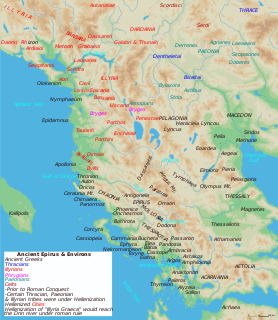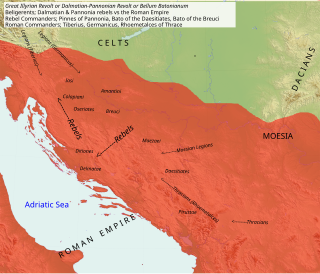Related Research Articles

Grannus was a Celtic deity of classical antiquity. Based on the etymology of his name, Grannus may have been associated with spas, thermal springs, and the sun; having bushy hair, beard and/or eyebrows; or having a connection with the concept of shining/gleaming. He was regularly identified with Apollo as Apollo Grannus. He was frequently worshipped in conjunction with Sirona, and sometimes with Mars and other deities.

Tiberius Claudius Pompeianus was a politician and military commander during the 2nd century in the Roman Empire. A general under the Emperor Marcus Aurelius, Pompeianus distinguished himself during Rome's wars against the Parthians and the Marcomanni. He was a member of the imperial family due to his marriage to Lucilla, a daughter of Marcus Aurelius, and was a key figure during the emperor's reign. Pompeianus was offered the imperial throne three times, though he refused to claim the title for himself.
Lucius Artorius Castus was a Roman military commander. A member of the gens Artoria, he has been suggested as a potential historical basis for King Arthur.

The ancient Greek city of Epidamnos or Epidamnus, later the Roman Dyrrachium, was founded in 627 BC in Illyria by a group of colonists from Corinth and Corcyra. Aristotle's Politics several times draws for examples on the internal government of Epidamnos, which was run as a tight oligarchy that appointed a ruling magistrate; tradesmen and craftsmen were excluded from power, until internal strife produced a more democratic government. The exiled oligarchs appealed to Corcyra while the democrats enlisted the help of Corinth, initiating a struggle between the two mother cities described by Thucydides as a cause of the Peloponnesian War. Individual trading with the local Illyrians was forbidden at Epidamnos: all traffic was through the authorized city agent or poletes. In the fourth century BC the city-state was part of the kingdoms of Cassander and Pyrrhus. The general vicinity of Epidamnus was called Epidamnia.

The so-called Free Dacians is the name given by some modern historians to those Dacians who putatively remained outside, or emigrated from, the Roman Empire after the emperor Trajan's Dacian Wars. Dio Cassius named them Dakoi prosoroi meaning "neighbouring Dacians".

Bato the Daesitiate was a chieftain of the Daesitiates, an Illyrian tribe which fought against the Roman Empire between 6 and 9 AD in a conflict known as Bellum Batonianum.

The Bellum Batonianum was a military conflict fought in the Roman province of Illyricum in the 1st century AD, in which an alliance of native peoples of the two regions of Illyricum, Dalmatia and Pannonia, revolted against the Romans. The rebellion began among native peoples who had been recruited as auxiliary troops for the Roman army. They were led by Bato the Daesitiate, a chieftain of the Daesitiatae in the central part of present-day Bosnia, and were later joined by the Breuci, a tribe in Pannonia led by Bato the Breucian. Many other tribes in Illyria also joined the revolt.
The gens Afrania was a plebeian family at Rome, which is first mentioned in the second century BC. The first member of this gens to achieve prominence was Gaius Afranius Stellio, who became praetor in 185 BC.
The gens Vitellia was a family of ancient Rome, which rose from obscurity in imperial times, and briefly held the Empire itself in AD 69. The first of this gens to obtain the consulship was Aulus Vitellius, uncle of the emperor Vitellius, in AD 32.
Legio VI Hispana may have been a legion of the Imperial Roman army. Only a few records attesting a "VI Hispana" were known in 2015. Seyrig (1923) argued that this unit was created in AD 68 and disappeared before 197. Another theory is that VI Hispana was created after 197 and was destroyed in the turmoil of the Empire's Third Century Crisis.
The gens Tineia was a Roman family of imperial times. Members of this gens first appear in history in the time of Hadrian; the first to obtain the consulship was Quintus Tineius Rufus in AD 127.
Sextus Catius Clementinus Priscillianus was a Roman military officer and senator who was appointed consul in AD 230.
The gens Sedatia, occasionally written Sedata, was a plebeian family at ancient Rome, which flourished from the first to the third century. The only member of this gens known to have held a seat in the Roman senate was Marcus Sedatius Severianus, consul suffectus in AD 153.

A burgus or turris ("tower") is a small, tower-like fort of the Late Antiquity, which was sometimes protected by an outwork and surrounding ditches. Darvill defines it as "a small fortified position or watch-tower usually controlling a main routeway."
The gens Laecania or Lecania was a minor plebeian family at ancient Rome. Members of this gens first appear in history during the reign of Tiberius. The first to attain the consulship was Gaius Laecanius Bassus in AD 40.
The gens Poppaea was a minor plebeian family at Rome. Members of this gens first appear under the early Empire, when two brothers served as consuls in AD 9. The Roman empress Poppaea Sabina was a descendant of this family, but few others achieved any prominence in the Roman state. A number of Poppaei are known from inscriptions. The name is sometimes confused with that of Pompeia.
The gens Pedia was a plebeian family at Rome. Members of this gens are first mentioned in history during the final century of the Republic, and for the next two centuries they were distinguished in statesmanship, rhetoric, art, and law. The first of the Pedii to obtain the consulship was Quintus Pedius, the nephew of Caesar, in 43 BC.
Gaius Calpetanus Rantius Quirinalis Valerius Festus was a Roman senator, general, and amicus to each of the Flavian emperors. He proved his value to the Flavians when, as legatus, or commander, of Legio III Augusta stationed in Africa, he assassinated the proconsul, who favored a rival of Vespasian during the Year of Four Emperors. He maintained his loyalty through the reigns of his sons Titus and Domitian, but fell out of favor during the latter's reign and was forced to commit suicide.
The gens Saliena or Salliena, also written Salena, Sallena, Sallenia, and Sallienia, was a minor plebeian family at ancient Rome. Few members of this gens are mentioned in history, but a number are known from inscriptions.
References
- ↑ (in French) Gilbert Charles-Picard, Ostie et la Gaule de l'Ouest, MEFRA , 93, 2, 1981, p. 887